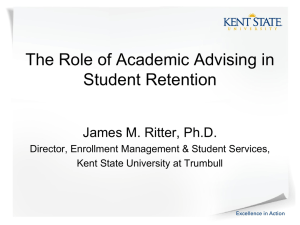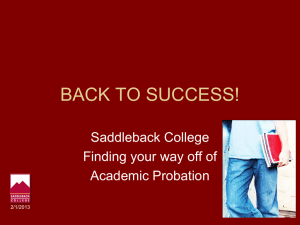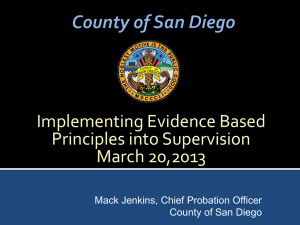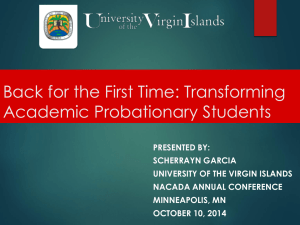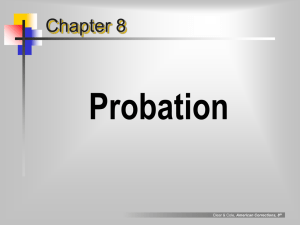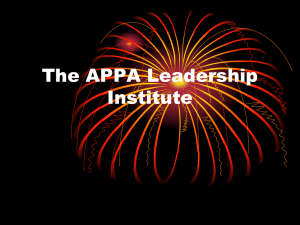probation review
advertisement
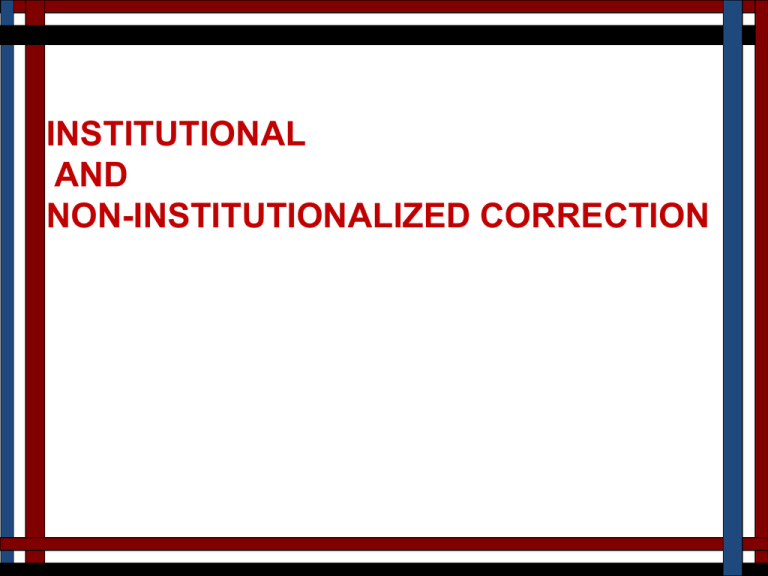
INSTITUTIONAL AND NON-INSTITUTIONALIZED CORRECTION House Bill No. 393 – filed by Teudolo C. Natividad and Ramon Bagatsing. This is the second Bill/measure that attempts to established an adult probation in the Philippines. It was passed in the lower house but pending in the senate when martial law was proclaimed. The present probation law: Presidential Decree 968 – Probation Law of 1976 - This was signed into law by then President Ferdinand Marcos on July 24, 1976 during the last day of the first national conference on Crime Control held at Camp Aguinaldo. January 3, 1978 – effectivity of the application of the substantive provisions concerning grant of probation. Teudolo C. Natividad – former NAPOLCOM commissioner and former Congressman of Bulacan. - Known as the “father” of Probation in the Philippines. Application for Probation - The application for probation shall be filed by sentenced or convicted offender whose sentence is not more than 6 years imprisonment. It shall be filed with the court that tried and sentenced the offender. - Section 32, RA 6425 (Dangerous Drug Act of 1972) Probation is granted to drug addicts. - PD 603, amended by PD 1179 (Child & Youth Welfare Code) probation to minor offenders. - PD 968 was approved only on July 24, 1976 and became operational on January 3, 1978. Sentenced offenders 18 years and above can apply probation before serving sentence. - The first probation in 1937 was declared unconstitutional because it covers only provinces that can financially afford to adopt the law. Petition for Probation Is there a need to apply for probation to avail of its benefits? - Yes, it will not be granted except upon the application by the accused. The necessity for such application is indicated in Sec. 4, PD 968, which states that “the trial court may, after it shall have convicted and sentenced a defendant and upon application by said defendant within the period of perfecting an appeal…. When can a petitioner file his application for probation? - the law says that the application should be made within the period for perfecting an appeal or within 15 days from the promulgation of notice of judgment. Is there a form prescribed for the application for probation? - Yes, it shall be in the form approved be the Secretary of justice as recommended by the Administrator or as may be prescribed by the SC. Where can we file the application for probation? -The application for probation be filed directly to the trial court that heard and sentenced the person applying for probation. What then be the duty of the court after receipt of the application? - the trial court may notify the concerned prosecuting officer of the application at a reasonable time before the scheduled hearing thereof. Procedures in Applying for Probation: 1. The offender or his counsel files a petition with the convicting court 2. The court determines convict qualifications and notifies the prosecutor of the filing of the petition 3. The prosecutor submits his comments on such application within 10 days from receipt of the notification 4. If petitioner is qualified, his application is referred to the probation officer for post-sentence investigation 5. The post-sentence investigation report (PSIR) is submitted by the probation officer to the court within 60 days 6. The court grants or denies the petition for probation within 15 days upon receipt of the PSIR. Effects of filing an application for Probation a) the court may, upon receipt of the application suspend the execution of sentence imposed in judgment; b) pending the submission of the PSIR and the resolution on the application, the applicant may be allowed on temporary liberty under his bail, on a new bail, or released on recognizance. Disqualifications for Probation a. Those who were sentenced to more than 6 years b. Those who were convicted of crimes against the security of the state (Art. 134 to 157 except 135, 140 and 152 of the RPC) c. Those previously convicted and punished of not less than 1 month and 1 day imprisonment and/or fine of not less than 200 pesos (include those punished with destierro) d. Those who were previously granted probation under P.D. 968 e. Those who were already serving their sentence when probation became applicable The Court will not grant Probation if it finds: a. The offender can be treated better in a mental institution or other places for correction b. The offender is a risk to the community c. The offense is grievous to the eyes of the community When Probation is granted, what conditions are imposed by the court? a. The probationer must present himself to his probation officer within 72 hours b. Report to his probation officer at least once a month c. Not to commit another crime d. Comply with any other lawful conditions imposed by the court. If the probationer committed a crime while under probation, what would be the consequences? a. The probationer will be arrested for violation of the condition of probation b. Prosecution of the new crime committed c. The court will order the serving of the original sentence of the previous offense How long is the period of probation? a. Not more than 2 years if the sentence is imprisonment for 1 year or less b. Not more than 6 years if t he sentence is imprisonment for more than 1 year but not more than 6 years. Note: Probation starts upon issuance of the court granting probation. When should probation be denied? a. The offender is in need of correctional treatment that can be provided more effectively by his commitment to an institution b. There is undue risk that during the period of probation the offender will commit another crime c. Probation will depreciate the seriousness of the offense. The offender may be released pending application for probation: a. On the same bond he filed during trial b. On a new bond c. To the custody of a responsible member of the community if unable to file bond When can the Court Modify the Conditions for Probation? a. at any time during supervision b. after summary hearing when the probationer violated any of its conditions c. upon application by the probation officer or the probationer himself Note: only the judge who heard and decided the case has the power to grant, deny, modify, revoke and terminate probation. OUTSIDE TRAVEL 1. Probation officer authorized the probationer to travel outside the area of the operation for a period of 10 days but not exceeding 30 days. 2. If 30 days, Probation must file 5 days before travel a request to travel outside for the approval of Probation authorities. 3. If more than 30 days Probation Authorities shall recommend for Court Approval. CHANGE OF RESIDENCE 1. The probationer must file a request for change of residence at the city or provincial Parole and Probation officer to the court approval. 2. If approved, The RTC which has jurisdiction over the place shall have full control of the probationer. Who is a volunteer probation aide? - he/she is a civilian of good repute and integrity, at least 18 years of age, appointed by the Probation Administration to assists the Pos in investigation and supervision. A VPA is not entitled to salary but is given a reasonable travel allowance. Termination of Probation: after the probationer has satisfactorily completed the probation period, the Probation Officer shall submit termination report to the court containing the ff: a. condition of probation b. program of supervision and response to treatment c. recommendation Two ways of terminating probation: 1. After period of probation with satisfactory compliance with conditions of probation. 2. Other ways of terminating probation a. termination before the expiration of the period (served at least 1/3 of the imposed period but not less than 6 months) b. termination by pardon of the probationer (either absolute or conditional) c. Deportation of the probationer – when an alien on probation is deported, probation will necessary be terminated. d. Death of probationer. Rights Restored after Termination of Probation a. All civil rights suspended when the offended was convicted and sentenced are restored after the termination of probation b. liability to pay a fine is also discharged IN CASE OF SUBSIDIARY IMPRISONMENT How Can Probation help in the Prevention of Crime? - when in the community, he is helped and given opportunities to be productive and responsible instead of going to prison - hopefully, these situations restrain the probationer from committing crime How can Community help in the Success of Probation? 1. community accepting the probationers, giving them a feeling of belongingness 2. community agencies and schools are being opened for the training and treatment of probationers 3. community leaders and layman allowing the participation of probationers in developmental programs 4. religious organizations giving the probationers spiritual advice and extending their social action programs to probationers 5. various organizations providing temporary housing for probationers 6. the community playing an equally important role after the termination of probation, it should be ready for the reintegration of the individual into community life. Difference of Probation from Imprisonment and Parole: 1. Probation is an alternative to imprisonment. Instead of being confined in prison, the probationer is released to the community by the court with conditions to follow and is placed under the supervision of PO. 2. Parole is a conditional release of a prisoner whereby he is placed under the supervision of a Parole Officer after serving his minimum sentence. 3. Probation is a community-based approach to reformation of offenders, while imprisonment adopts the institutionalized approach. 4. Probation is handled by the Probation Administration while parole is administered by the Parole Board 5. Probation is enjoyed only once while parole may be granted more than once, depending on good behavior during imprisonment. 6. Probation is more beneficent because it restores full civil rights to the probationer upon termination unlike parole. 7. Probation is essentially a judicial function (under the control of the court) while parole is an executive function (under the Parole Board). Notes to remember: P.D. 1257 – participation of the prosecutor in the determination of the application for probation P.D. 76 – the period of punishment which is probationable is extended from 6 years and 1 day. P.D. 1990 – the period of punishment which is probationable is lowered again from 6 years and 1 day to 6 years or less E.0.292 (Administrative Code of 1987) – renamed the Probation Administration into Parole and probation Administration NATURE OF INFORMATION GATHERED: - Strictly confidential and privilege NATURE OF POST SENTENCE INVESTIGATION - It is recommendatory in nature and address to the sound discretion of the trial court EFFECTIVITY OF PROBATION - Upon its issuance FINALITY The order of the court granting or denying probation SHALL NOT BE APPEALABLE. Probationer – a person placed on probation Absconding probationer – a person whose probation was granted but failed to report for supervision or fails to continue reporting for supervision or whose whereabouts are unknown for a reasonable period of time. Probation officer – one who investigates for the court a referral for probation or one who supervises a probationer or both. Petitioner – an accused or defendant who files a formal petition for probation Absconding petitioner – a convicted defendant whose application for probation has been given due course by the court but fails to report to the probation office or cannot be located within a reasonable period of time. Parole – refer to the conditional release of an offender from a penal institution after he has served the minimum period of his prison sentence. Parolee - refer to a person who is released on parole Pardonee – refer to a person who is released on conditional pardon Client – refer to a pardonee/parolee who is place on supervision Board – refers to the Board of Pardons and parole Administration – refer to the Parole and Probation Administration Director – refer to the Director of the BuCor Administrator – refer to the administrator of Parole and Probation Administration History of Parole system in the Philippines: - it came into existence by the passage of Act 4103 as amended by Acts 4203 and 4225, otherwise known as the Indeterminate Sentence Law, which took effect on Dec. 5, 1933. Board of Pardons and Parole – administers the Parole system of the country. Pre-Parole Investigation: The Administration has been authorized by the Board to conduct pre-parole investigation of deserving city, provincial and national prisoner confined in the city and provincial jails, the national penitentiary and penal colonies, whenever their best interests and that of justice will be served thereby, and to submit reports of said investigation at least 60 days before the expiration of the minimum sentences of the prisoners concerned. PRISONERS QUALIFIED FOR PAROLE: Unless otherwise disqualified under Sec. 15 of the rules, a prisoner shall be eligible for the grant of parole upon showing that – a. he is confined in a jail or prison to serve an indeterminate prison sentence, the maximum period of which exceeds one year, pursuant to a final judgment of conviction; and that b. he has served the minimum period of said sentence less the Good Conduct Time Allowances (GCTA) earned. c. There is a reasonable probability that if released, he will be lawabiding; and that d. His release will not be incompatible with the interests and welfare of society. PRISONERS DISQUALIFIED FOR PAROLE: 1. those persons convicted of offenses punished with reclusion perpetua; 2. those convicted of treason, conspiracy or proposal to commit treason; 3. those convicted of misprision of treason, rebellion, sedition or espionage; 4. those convicted of piracy; 5. those who are habitual delinquents; 6. those who escaped from confinement or those who evaded sentence; 7. those who were granted conditional pardon and violated any of the terms thereof; 8. those whose maximum term of imprisonment does not exceed 1 year or are with a definite sentence; 9. those suffering from any mental disorder as certified by a psychiatric report of the bureau of correction or national center for mental health; 10. those whose conviction is on appeal; 11. those who have pending criminal case for an offense committed while serving sentence. COMPOSITION OF THE BOARDS OF PARDON AND PAROLE Chairman - Secretary of the DOJ Ex-Officio - Probation Administrator of the Parole and Probation Administration Members: a. Sociologist b. Clergyman/Educator c. Psychiatrist d. Person qualified for the work by training/experience and a member of the Philippine BAR. Pardon – an act of executive clemency, by a head of a state for the purpose of exempting an individual from the punishment imposes upon him by a court of law. - It is an act of grace and the recipient is not entitled to it as a matter of right. Kinds of Pardon 1. Absolute Pardon It is an absolute pardon when it is granted by the Chief Executive without any conditions attached. Absolute pardon serves to wipe away the guilt of a pardonee, and makes him innocent as if he has not committed any crime. 2) Conditional Pardon It is conditional when it is granted by the Chief Executive subject to the conditions imposed on the recipient and accepted by him. Usually, the person granted with conditional pardon has served a portion (at least ½ of the minimum of his indeterminate sentence) of his sentence in prison Limitations of the Pardoning Power of the President The following are the limitations of the pardoning power of the President: 1) it may not be exercised for offenses in impeachment cases; 2) it may be exercised only after conviction by final judgment; 3) it may not be exercised over civil contempt (as for refusing to answer a proper question as a witness in a case); 4) in case of violation of election law or rules and regulations, no pardon, parole, or suspension of sentence maybe granted; 5) cannot be exercised to violation of tax laws. OTHER FORMS OF EXECUTIVE CLEMENCY 1) Amnesty Is a general pardon extended to a group of persons generally exercised by the Chief Executive with the concurrence of congress. It is an act of sovereign power granting oblivion or general pardon for past offense and rarely, if ever, exercised in favor of single individual is usually exerted in behalf of certain classes of person who are subjected to trial but not have been convicted. Note: Amnesty can be availed of before, during and after the trial of the case, even after conviction. Differences between Amnesty and Pardon As to the number of those who can avail: Pardon includes any crime and is exercised individually by the Chief Executive, while amnesty is a blanket pardon granted to a group of prisoners, generally political prisoners. As to the Time to Avail: Pardon is exercised when the person is already convicted, while amnesty maybe given before trial or investigation is done. As to the Consent of Congress: Pardon is granted by the Chief Executive and such as private act, which must plead and proved by the person pardoned because the court takes no choice thereof. While amnesty is by proclamation with concurrence of congress, and it is a public act, which the court should take judicial notice. As to the Effect: Pardon is an act of forgiveness, i.e. it relieves the offender from the consequences of the offense, while amnesty is an act of forgetfulness. i.e. it puts into oblivion the offense of which one is charged so that the person as if he had never committed the offense. As to the Crime committed: Pardon is granted for infractions of the peace of the State while amnesty, for crimes against sovereignty of the state (ex. political offense) 2) Commutation of Sentence It is a change of the decision of the court made by the Chief Executive by reducing the degree of the penalty inflicted upon the convict, or by decreasing the length of the imprisonment of the original sentence. Specific cases where commutation is provided for by the code: 1. When the convict sentenced to death is over 70 years of age; 2. When ten justices of the Supreme Court failed to reach a decision for the affirmation of the death penalty; In other cases, the degree of the penalty is reduced from death to reclusion perpetua. In Commutation of Sentence consent of the offender is not necessary. The public welfare, not his consent, determines what shall be done. 3. Reprieve – the temporary stay of the execution of sentence (applicable only to death sentence) GCTA – is a privilege granted to a prisoner that shall entitle him to a deduction of his term of imprisonment. Under Art.97, RPC, the GCTA are: 1. 5 days per month during the first 2 years of imprisonment 2. 8 days per month during the 3rd to 5th years of imprisonment 3. 10 days during the following years until the 10th years of imprisonment 4. 15 days during the 11th and successive years Special Time Allowance for Loyalty (Art. 158, RPC) -A deduction of 1/5 of the period of the sentence of any prisoner who evaded the service of sentence on the occasion of disorders due to conflagrations, earthquakes, or other calamities shall be granted if he returns to authorities within 48 hours after the president declared that the calamity is over. - Once granted hall not be revoked.

